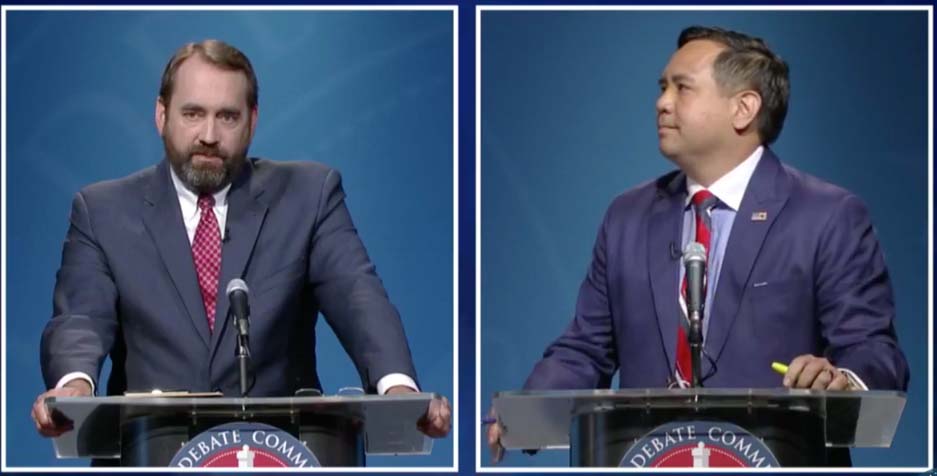
GOP Attorney General candidates David Leavitt (left) and Sean Reyes (right) faced off June 2 in a broadcast forum sponsored by the Utah Debate Commission.
SALT LAKE CITY – A much-anticipated debate between GOP candidates for the role of Utah Attorney General played out June 2 like a high-profile courtroom drama with charges and counter-charges flying in all directions.
During the broadcast forum sponsored by the Utah Debate Commission, Attorney General Sean Reyes and Utah County Attorney David Leavitt duked it out over issues including political loyalties, campaign donations and criminal justice reform, albeit with an inside baseball for-lawyers-only spin.
Early in the hour-long exchange, Leavitt accused Reyes of politicizing the Attorney General’s office.
“There has not been an attorney general in recent memory more politically aligned with one party and that advances the interests of one party more than Mr. Reyes,” Leavitt claimed.
Reyes simply shrugged off that charge. While he is considered a rising star in Republic Party circles, Reyes’ national reputation is built on having cleaned up a scandal-tarnished AG’s office after being appointed by Gov. Gary Herbert in 2013.
While acknowledging that there’s no way to avoid politics in an elective position, Reyes countered, the law comes first in the Attorney General’s Office.
Leavitt also charged that Reyes’ campaign has accepted large donations from groups with a political interest in the activities of the AG’s office, including the Republican Attorneys General Association.
Reyes didn’t deny accepting those legal contributions, but added that the donors know that they “aren’t buying any influence.” As proof, he cited Utah’s participation in a nationwide lawsuit against tech-giant Google, another contributor to his campaign.
Leavitt then shifted gears to his favorite topic, criminal justice reform.
Much of Leavitt’s legal career has been spent in advising various governments on ways to improve legal systems, fight corruption and foster judicial integrity. Most recently he acted as an advisor to the Supreme Court of Ukraine (2001-09) and to the National Institute of Justice for Moldova (2014-18).
Leavitt calls criminal justice reform “the issue of our generation” and has advocated against plea bargains and for alternative forms of punishment for non-violent offenders. But Reyes dismissed Leavitt’s call for all criminal cases to go to jury trials as a Quixotic idea that Utah can’t afford.
When Leavitt accused Reyes of failing to provide leadership to county attorneys, Reyes explained that it’s not the attorney general’s job to supervise elected county attorneys. He added that was fortunate for Leavitt, since the state has received more complaints from local leaders and residents about Leavitt since 2018 than any other public official.
Finally, the incumbent and challenger crossed swords over the issue of the day, civil unrest in response to police brutality.
Leavitt called the ongoing disturbances in American cities a symptom of government not listening to minority complaints and not holding police accountable for their actions. Prosecutors and Attorneys General like Reyes, he said, too often view themselves as part of the law enforcement community rather than a check and balance on police authority.
“As a person of color,” Reyes replied, “I understand (that role) very deeply.” But he added that Leavitt must be “uninformed” about the many lawsuits that the Attorney General’s Office has filed against sheriffs, police chiefs and individual law enforcement officers.
The winner of the nomination for the Attorney General’s office in the GOP primary balloting on June 30 will face off against Democratic AG candidate Greg Skordas.

